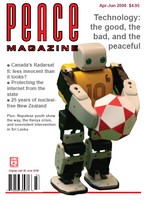
Peace Magazine Apr-Jun 2008, page 4. Some rights reserved.
Search for other articles by PMag staff here
Whether you like or dislike the robot soccer player on our cover may reveal something about your position on a controversy that peaceniks often discuss: whether there are ever any such things as "technological fixes." We offer two articles in this issue that bear upon the question, and the answer they suggest is this: Yes, there can be terrific technological solutions to problems. On the other hand, not all of the technology that is promoted as advantageous actually is so. (RADARSAT, for example, has certain significant down-sides.) Moreover, a genuine technological breakthrough can be reversed if someone is determined to do so.
Our interview with Ron Deibert about his Internet-protection work proves that technological fixes are not necessarily permanent. For one thing, it is a mistake to suppose that the Internet is inherently beyond political control. He is working to give people full access to the Internet, even if they are governed by repressive regimes that try to prevent it. But his struggle will never end, for whenever one mind can find a way around censorship, another mind will find a new way to impose it.
In this issue we also have stories from war zones - or zones that were recently at war. Michael Shipler tells uplifting stories about Nepali youths who want to build a peaceful society and who are learning to work out complex, controversial issues. And Katie Meyers has an article about the peacebuilding efforts that went on in Kenya, even during the recent violence. Finally, among the stories about peace work in the midst of war, Angela Pinchero writes about her experiences with Nonviolent Peaceforce in Sri Lanka.
And we have an important contribution to the ongoing discussions about the challenge of spreading democracy abroad: an article by the NDP's own Ed Broadbent, who served that goal while heading Rights and Democracy.

Peace Magazine Apr-Jun 2008, page 4. Some rights reserved.
Search for other articles by PMag staff here